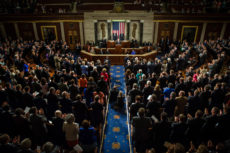Partisan Politics Disenfranchises the Minority Party
 The House and Senate have each passed their versions of a tax reform bill. Those bills now go to a conference committee consisting of members of the House and Senate to reconcile their (minor) differences so that both houses can vote on and pass the same bill. The conference committee is just a formality. The Republicans will have already ironed out the differences before the conference committee meets, and the committee will just rubber-stamp the Republican-designed tax reform. Democrats will have no say. Why?
The House and Senate have each passed their versions of a tax reform bill. Those bills now go to a conference committee consisting of members of the House and Senate to reconcile their (minor) differences so that both houses can vote on and pass the same bill. The conference committee is just a formality. The Republicans will have already ironed out the differences before the conference committee meets, and the committee will just rubber-stamp the Republican-designed tax reform. Democrats will have no say. Why?
The answer is partisan politics. Members of both parties will (mostly) vote with their parties because of pressure from the party leadership. That means Democrats will (almost surely) vote against the tax reform, so the Republican majority must get almost all their members to vote for it.
Because the Republican majority cannot count on any Democratic support, they must design legislation so that it meets the approval of (almost) all the members of their party, including those who may have views far different from most members of their party.
What if moderate Democrats were open to supporting the tax reform effort? Then the Republican majorty could safely ignore any extreme members of their own party, picking up some Democratic support to make up for any dissenting Republicans. In that case, legislation would reflect some of the views of the minority party. By being so partisan, Democrats are cutting themselves out of having any influence over the tax reform.
Republicans have been the same way, of course. Think Obamacare. But Obamacare was different from today’s tax reform. Republicans were in strong opposition to Obamacare and didn’t want to have any part in its design. They deliberately disenfranchised themselves because they didn’t want to bear any responsibility for Obamacare. But tax reform is an issue of interest to Democrats and Republicans. Democrats have made an error by insisting that their members be so partisan in their voting, and it has cost them influence.
I’m not complaining about this or saying the impending tax reform would have been better had it had more Democratic input. I’m just saying that by being so partisan, the Democrats have cost their members–and their constituents–by eliminating any influence they could have had to steer legislation their way.


















